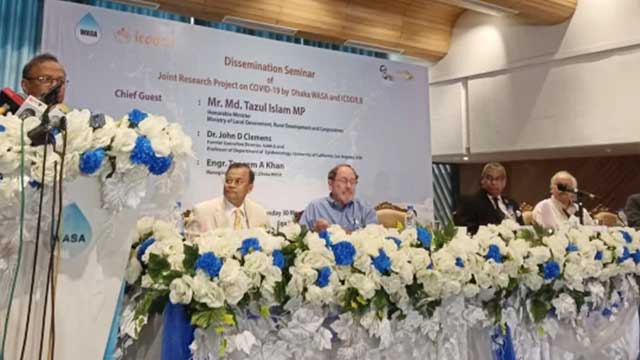A study on Monday revealed the presence of the Coronavirus in Dhaka sewage though no such virus was found in surface water.
The International Centre for Diarrhoeal Disease Research, Bangladesh and the Dhaka Water Supply and Sewerage Authority jointly conducted the study titled ‘Survey of sewage and other contaminated surface water and treated water sources for the presence of SARS-Cov-2 in and around Dhaka City’ between August 2020 and January 2021.
Coronavirus is also known as SARS-CoV-2.
Presenting the findings at a programme at Dhaka WASA headquarters, Sirajul Islam, emeritus scientist at the ICDDR,B and the principal investigator of the study, said 57.1 per cent of raw sewage and 53.3 per cent of sludge samples studied had SARS-CoV-2 RNA.
There was no presence of SARS-CoV-2 in the samples collected after treatment by the Pagla Sewage Treatment Plant.
The SARS-CoV-2 RNA was also not found in the water and sediment samples collected from the rivers Buriganga and Turag and pond ecosystems.
The difference in physicochemical parameters such as pH, temperature, total dissolved solids, dissolved oxygen, conductivity, and dissolved solid in river and pond water samples were not prominent but variation was observed in treated and untreated sewage samples collected from different sampling sites of the treatment plant, said Sirajul.
Local government minister Md Tazul Islam, who attended the presentation ceremony as chief guest, said that the findings made him relived as there was no virus in open water sources, which were used by people for many purposes.
‘Continue study to see if there is any harmful virus in water,’ he asked WASA.
Dhaka WASA chief microbiologist Alamgir Hossain said that the study was the first of its kind, which indicated the well functioning of its sewerage treatment plant.
Dhaka WASA managing director Taqsem A Khan said that the lone water supplying government agency was developing its customer service through research and development. Research on the presence of viruses was one of them.
Tazul Islam claimed that Dhaka residents were not getting pure water due to pipeline disruption despite Dhaka WASA producing ‘completely safe water.’
‘Check illegal water connections to curb water contamination,’ he said, directing the WASA authorities to bring the culprits to book.
ICDDR,B’s former executive director John D Clemens appreciated Dhaka WASA for taking up this research at a time when there was not much knowledge about the environmental contamination of the Coronavirus.
ICDDR,B acting executive director Shams El Arifeen spoke, among others, at the event.





